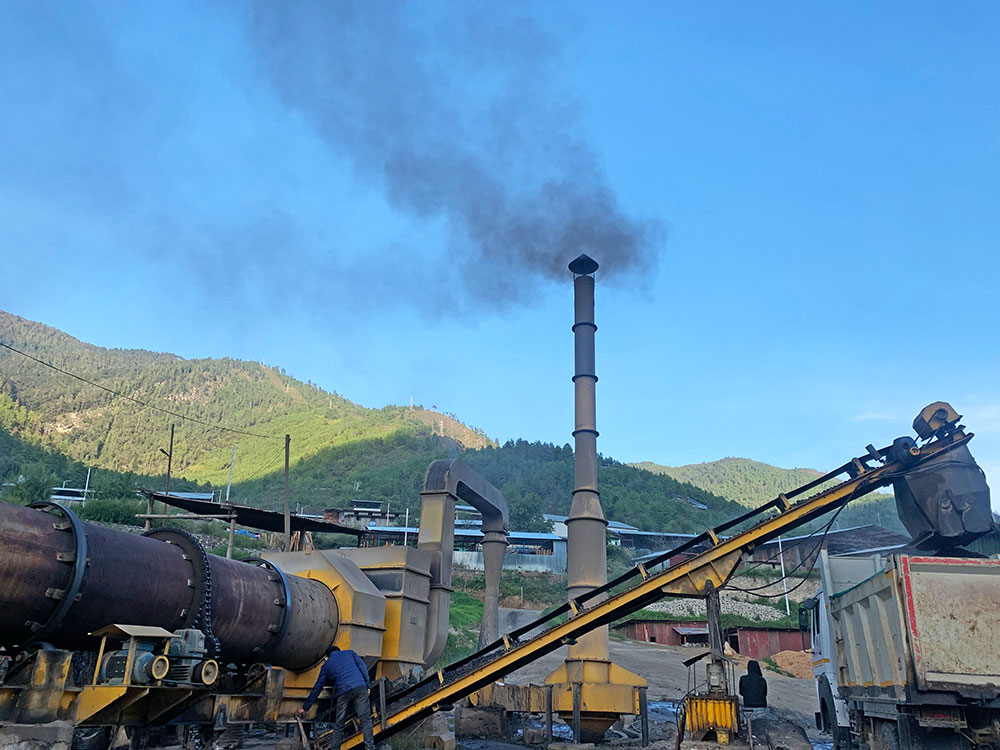Yangyel Lhaden
It was noon in Bjemina, Thimphu. A schoolteacher in the locality was conducting a reading class outside when a bitumen plant emitted dense smoke.
Students complained of headache, nausea, and difficulty in breathing. The students are aged between five and 14.
A Class Five student, Sonam Dechen, said that she suffered from a headache and dizziness because of the smell. “It was difficult to breathe.”

Students complain of suffocation, headache, and nausea due to the bitumen smoke
A Class Two student Ngawang Sangay said that it was difficult to study in such an environment.
Another Class Two student, Thaye Nidup, said that he did not feel like coming to school. “My parents say the factory will be stopped soon and to bear with it for a while.”
Whenever the bitumen smoke covers the school and students complain, teachers allow students to take a 10-minute break.
The teacher, Sita Dahal, said smoke from the plant covered the school in the morning. “The intensity of the smoke and the smell was stronger in the afternoon when it was windy. Closing the windows and door doesn’t help; the bitumen smell is too strong.”
Green Road’s Asphalt Bitumen Plant (ABP) is about 50m away from the school.
The plant uses plastic waste to replace bitumen and in the last seven years 560 metric tonnes (MT) of plastic waste from landfills have been used to construct plastic roads.
Besides the school, the community living to the north of the factory also has complaints about the plant.
A resident, Chimi, said that she always wakes up with a sore throat and stuffy nose from the pollution.
She said it was not possible to work in the fields with the smell. “I am not asking for the factory to stop, but to operate from a different location where there are no nearby households.”
Meanwhile, the school principal, N.P Biswa, said the school is concerned about the health of students and submitted a letter on July 13 to the Department of Industry’s (DoI) estate manager.
According to Bjemina tshogpa, Tshering Om, 13 households submitted a letter to the gewog office to remove the factory in April. “So far no action has been taken.”
She said that earlier, the gewog identified a place at Gidaphu for the plant to relocate to, and got clearance from all the stakeholders, but the proprietor refused to relocate, stating the other location is not suitable.
According to the gewog mangmi, the letter was forwarded to Thimphu dzongkhag.
The gewog mangmi said that the officiating environmental officer stated they would study the pollution from the plant, but they never came.
Thimphu Dzongdag Dorji Tshering said after receiving the complaint, they formed a dispute settlement committee to assess the environmental hazards from ABP. “The environmental assessment was not carried out at the time, because the gewog said that the issue had been settled.”
He said the committee will visit the site in the coming days, as it was important to study the environmental hazards.
The DoI estate manager, Daba, said that though ABP has environmental clearance, the DoI wants to check the emissions following the complaint.
He said there was only one instrument to check the emission levels and it is with a factory in Pasakha. “Due to quarantine measures, the official could not come to Thimphu with the instrument.”
The founder of Green Roads and proprietor of ABP, Rikesh Gurung, said he offered to sponsor the official to come from Pasakha to check whether his plant meets environmental standards. “The plant has a double filter and water-cooling system to reduce the pollutants and maintain itself at emission standards.”
He said the smoke is similar to diesel smoke, as the plant uses diesel to burn bitumen, and most parts are run by electricity. “ The smoke is safe.”
Online research states short-term exposure to high concentrations of diesel exhaust and diesel particulate matter can result in dizziness; headaches; and eye, nose and throat irritation. It also states that exposure can increase a worker’s risk of cardiovascular, cardiopulmonary and respiratory disease, and lung cancer.
Meanwhile, ABP signed a contract to operate for two years with the Ministry of Economic Affairs in 2019 and completed the two-year term in April 2021. The plant got an extension until October 1.
The area where ABP is located is supposed to be a landfill for the waste from the industrial estate.
Daba said that since there was no budget to construct a landfill, the space was temporarily allotted to ABP.
He said that the deadline extension was given due to ongoing roadwork, and to make up for the plant closure during lockdowns. “The plant has to relocate or close within this month, as we received the budget to construct the landfill.”
Rikesh Gurung said he is under pressure from Thimphu Thromde to deliver bitumen on time for ongoing roadwork especially for the four-lane road between Bhutan Telecom office and Jungshina bridge. “But authorities want me to stop the plant.”
He said that he was awarded roadwork for north Thimphu and there are only two bitumen plants in Thimphu. “It is important to run my plant. At least three bitumen plants are needed to complete the four-lane road. We are able to deliver 16 truckloads of bitumen when the demand is 20 truckloads for the four-lane road daily.”
Rikesh Gurung said that although he was allocated a new location with three acres of land, he will have to spend more than Nu 3M to relocate, as the road is steep and he has to improve it. “Without a good road, it is impossible to relocate my plant, which weighs more than 60 tonnes.”
He said that he is looking forward to requesting that the Ministry of Economic Affairs extend the contract until the roadwork is complete. “I could find a more suitable site later.”
Edited by Tashi Dema


